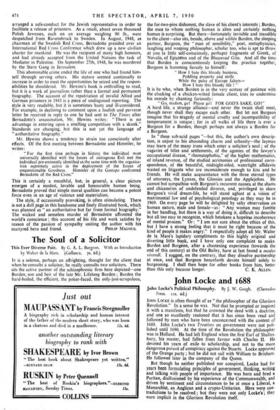The Soul of a . Solicitor. .
IT is a solemn, perhaps an affrighting, thought for the client that when he consults a solicitor, he really consults two solicitors. There sits the active partner of the schizophrenic firm here depicted—one Burden, son and heir of the late 'Mr. Lifelong Burden ; Burden the hard-boiled, the efficient, the poker-faced, the only-just-scrupulous, the for-two-pins dishonest, the slave of his client's interests ; Burden, the man to whom nothing human is alien and certainly nothing human is surprising. But there—fortunately invisible and inaudible to the client—also sits, beside, above and• within Burden, the sleeping partner, Burgeon, the "man of sensibility," poet, metaphysician, laughing and weeping philosopher, scholar too, who is apt to throw at you (a little self-consciously, perhaps) fragments of Greek, of Novalis, of Epictetus and of the Bhagavad Gita. And all the time that Burden is conscientiously keeping the practice together, Burgeon is humming fiercely to himself: "How I hate this bloody business,
Peddling property and strife
While the pulse of Europe falters—
How I hate this bloody life ! "
It is he who, when Burden is in the very ecstasy of patience with the clucking of--a chicken-witted female client, tries to undermine his morale by chanting furiously: "Go, madam, go! Please go! FOR GOD'S SAKE, GO!"
A hard life, a strange alliance—and never the twain shall meet, though never shall, they escape each other. But let not Burgeon imagine that his tragedy of mental cruelty and incompatibility of temperament is unique' for in all walks of life there is ever a Burgeon for a Burden, though perhaps not always a Burden for a Burgeon.
In "these sub-acid pages "—but this, the author's own descrip- tion, is unjust to his abounding charm and urbanity—the layman may learn of the many irons which enter a solicitor's soul ; of the vagaries of titles and settlements, of the agonies of the lawyer's occupational disease, " rhematophobia," of the higher mathematics, of inland revenue, of the studied acrimonies of professional corre- spondence, of the beautiful, midnight-oiled, watertight affidavits wasted on litigants who are inconsiderate enough to kiss and be friends. He will make acquaintance with the three eternal types of attorneys, the Lynxes, the Glossies and the Applejohns. He cannot but sympathise with Burgeon's recurrent nausea at the shams and chicaneriesof undefended divorce, and, privileged to share Burgeon's vivid' dream-life, he will stand aghast at a vision of Matrimonial law and of psychological penology as they may be in 1969. On every page he will be delighted by salty observation on human nature, male and female—as : "Any woman may fumble in her handbag, but there is a way of doing it, difficult to describe but all too easy to recognize, which betokens a hopeless incoherence of mental process." Or: "I am not sure about the ethics of this, but I have a strong feeling that it must be right because of the kind of people it makes angry." I respectfully adopt all Mr. Walter de la Mare's lapidary compliments to this highly original and diverting little bctok, and I have only one complaint to make. Burden and Burgeon, after a chastening experience (towards the end of this century) at the Old Bailey, have at last found a modus vivendi. I suggest, on the contrary, that they dissolve partnership at once, and that Burgeon henceforth devote himself solely to burgeoning. I shall then hope for other books from him, better






































 Previous page
Previous page